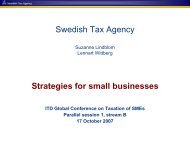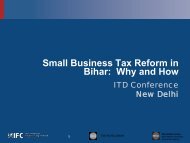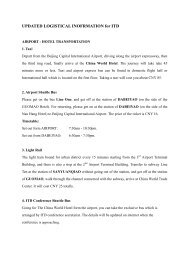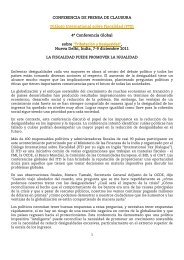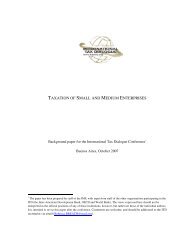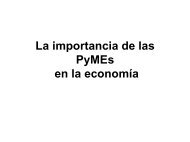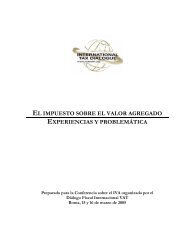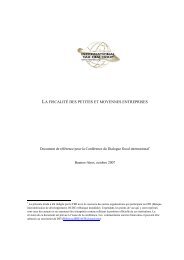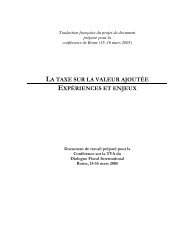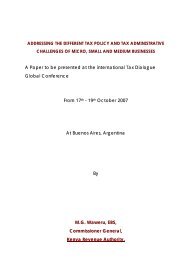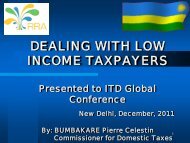Arcotia Hatsidimitris - International Tax Dialogue
Arcotia Hatsidimitris - International Tax Dialogue
Arcotia Hatsidimitris - International Tax Dialogue
You also want an ePaper? Increase the reach of your titles
YUMPU automatically turns print PDFs into web optimized ePapers that Google loves.
7. RESOURCES, SKILLS AND USE OF SPECIALISTS – 59<br />
Complexity<br />
A number of tax administrations considered that transfer pricing, although it is a far from<br />
straightforward subject, can become unnecessarily complicated when, for example, engagement with<br />
advisers leads to excessive analysis of perceived legal issues, premature legal argument, deployment<br />
of specialists and experts before they are needed, and generally unfocused economic analysis. Some<br />
suggested that this risked creating a mystique around transfer pricing work which could deter<br />
developing countries from taking up cases, hinder more developed countries, and could increase the<br />
costs for all. Those who raised this concern recognised that tax administrations, advisors and business<br />
alike all played their part in contributing to this perceived over-complication.<br />
Resources and skills – solutions<br />
Resources, knowledge management and training<br />
One of the ways in which tax administrations tackle some of the challenges outlined above lies in<br />
the organisation of their in-house resource. <strong>Tax</strong> administrations tend to organise their transfer pricing<br />
work in line with one of two broad business models. The first model is based on specialist teams who<br />
undertake the end to end process of transfer pricing – from risk identification through to resolution of<br />
audits and enquiries.<br />
South Africa, for example, is presently building an international tax team of up to<br />
40 people which will handle transfer pricing in this way. This model allows significant expertise to be<br />
built up and maintained but it does not grow across the tax administration a broad base of knowledge<br />
and skills in relation to transfer pricing risk.<br />
An alternative model involves creating a specialist function at the centre of the tax administration<br />
to support and advise auditors and inspectors how best to address the technical issues arising on their<br />
transfer pricing cases. It is rare for these specialists to work cases themselves but that can happen<br />
when issues are particularly novel or contentious. The advantage of this approach is that transfer<br />
pricing risk is identified alongside other tax risks by auditors and inspectors with the greatest<br />
knowledge of the business. This approach also allows for greater flexibility in resource deployment.<br />
A number of tax administrations combine the approaches in a range of ways. In the UK, for<br />
example, there is a central specialist advisory team on transfer pricing who do not generally lead on<br />
audits or enquiries. The UK also has a number of specialists within its LBS who share their experience<br />
of working transfer pricing cases with auditors and inspectors managing tax risk on a day to day basis.<br />
Leadership on transfer pricing and all other tax risk dealt with in the LBS is provided by the Customer<br />
Relationship Manager (CRM) accountable for the tax compliance of individual large businesses.<br />
The OECD sponsored multilateral training programmes offer an innovative approach to training<br />
in this area and one that helps to foster a common understanding of the issues among tax<br />
administrators from different countries.<br />
DEALING EFFECTIVELY WITH THE CHALLENGES OF TRANSFER PRICING © OECD 2012



